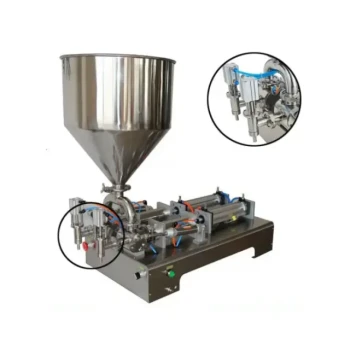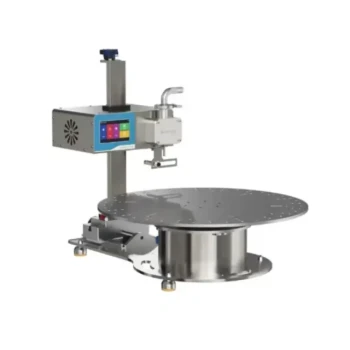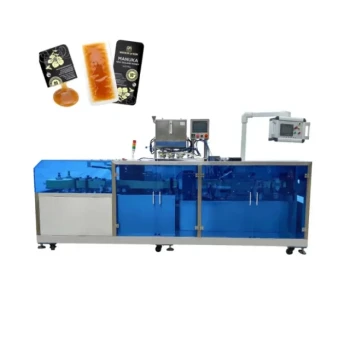At its core, pasteurization subjects honey to a controlled heating process, typically around 160°F (71°C). This high heat destroys the naturally occurring wild yeasts and denatures delicate enzymes and amino acids. The primary goal is to prevent fermentation and extend the honey's shelf life, but this stability comes at the cost of reducing some of its unique nutritional properties.
Pasteurization is a strategic trade-off. It sacrifices some of honey's beneficial natural compounds in exchange for a longer, more stable shelf life by eliminating the risk of fermentation and slowing crystallization.
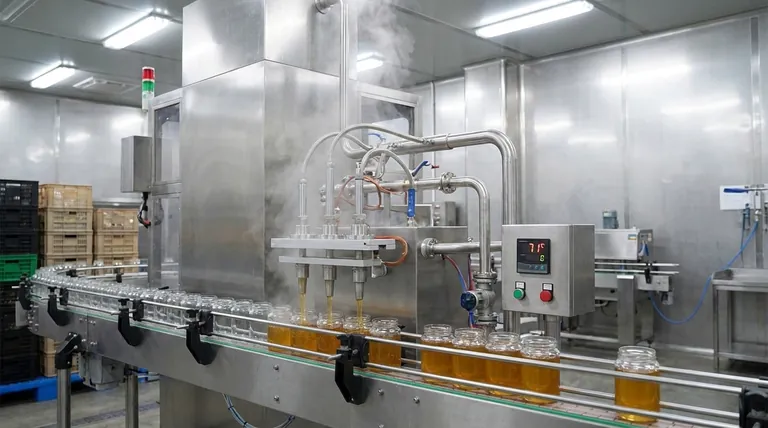
Why Honey is Pasteurized: The Problem of Spoilage
To understand the purpose of pasteurization, you must first understand the primary threat to honey's stability: fermentation.
The Inherent Risk of Wild Yeast
All raw honey contains dormant, wild yeast spores. In honey with low moisture content (typically below 17-18%), these yeasts remain inactive and pose no threat.
How Moisture Activates Fermentation
The danger arises when the honey's moisture content increases. Even a small amount of excess water can activate the dormant yeasts, initiating a fermentation process that turns the honey's sugars into alcohol and carbon dioxide. This spoils the honey, giving it a sour, "off" taste.
Pasteurization as a Sterilizing Step
The heating process of pasteurization is designed to kill these wild yeasts completely. By destroying them, manufacturers eliminate the possibility of fermentation, even if the honey's moisture content is slightly higher than ideal. This makes the final product more consistent and shelf-stable.
The Consequences of Heating Honey
While effective for preservation, applying high heat fundamentally alters honey's composition.
Destruction of Beneficial Enzymes
Raw honey contains enzymes like diastase and invertase, which are introduced by bees and play a role in the honey's unique characteristics. The heat from pasteurization denatures (destroys) these enzymes, removing a key component of what makes raw honey distinct.
Degradation of Nutrients
The high temperatures also degrade some of the delicate vitamins, antioxidants, and amino acids present in raw honey. While honey is not a primary source of these nutrients, the pasteurization process diminishes its overall nutritional profile.
Slower Crystallization
Pasteurization, often combined with fine filtration, helps keep honey in a liquid state for longer. The heat dissolves any existing sugar crystals, and filtration removes microscopic particles (like pollen) that can act as "seeds" for new crystals to form.
Understanding the Trade-offs: Raw vs. Pasteurized
The choice between raw and pasteurized honey is not about "good" versus "bad," but about different priorities.
The Case for Pasteurization: Consistency and Stability
For large-scale commercial producers, pasteurization is a critical quality control step. It guarantees a long shelf life, prevents costly spoilage from fermentation, and provides the clear, liquid product that many consumers expect.
The Case for Raw Honey: A More Natural State
For those seeking honey's full potential benefits, raw honey is the clear choice. It retains its natural enzymes, pollen, amino acids, and full antioxidant profile. This results in a product that is less processed and closer to its state in the hive.
The Reality of "Bad" Honey
Pasteurized honey is not "bad" or unsafe; it is simply a more processed food optimized for commercial stability. The primary loss is not in its fundamental sugar content, but in the complex, delicate compounds that give raw honey its unique character and potential health benefits.
Making the Right Choice for Your Goal
Your decision should be based on what you value most in the product.
- If your primary focus is a long, stable shelf life and preventing any risk of fermentation: Choose pasteurized honey.
- If your primary focus is preserving the full nutritional profile and natural enzymes: Choose raw, unpasteurized honey.
- If your primary focus is a consistently liquid texture that resists crystallization: Pasteurized honey is the more reliable choice.
Ultimately, understanding the impact of pasteurization empowers you to choose the type of honey that best aligns with your personal goals.
Summary Table:
| Aspect | Pasteurized Honey | Raw Honey |
|---|---|---|
| Wild Yeast | Destroyed | Present (dormant) |
| Fermentation Risk | Eliminated | Possible if moisture is high |
| Enzymes (e.g., diastase) | Denatured/Destroyed | Fully intact |
| Nutrients & Antioxidants | Diminished | Fully preserved |
| Crystallization | Slower due to heat & filtration | Natural and faster |
| Shelf Life | Longer and more stable | Shorter, requires proper storage |
Equip Your Apiary for Quality Honey Production with HONESTBEE
Whether you are a commercial apiary focused on large-scale, stable honey production or a beekeeping equipment distributor supplying the market, the right tools are essential for managing honey from hive to jar. HONESTBEE supplies the durable, high-quality beekeeping supplies and equipment you need to succeed.
- For Commercial Apiaries: Ensure efficient harvesting and processing with our reliable equipment, designed to support your operations whether you choose to pasteurize or sell raw honey.
- For Distributors: Source top-tier wholesale equipment to meet the diverse needs of your customers, from hobbyists to large-scale producers.
Let's discuss how our products can support your specific goals. Contact our team today to explore our wholesale catalog and find the right solutions for your business.
Visual Guide
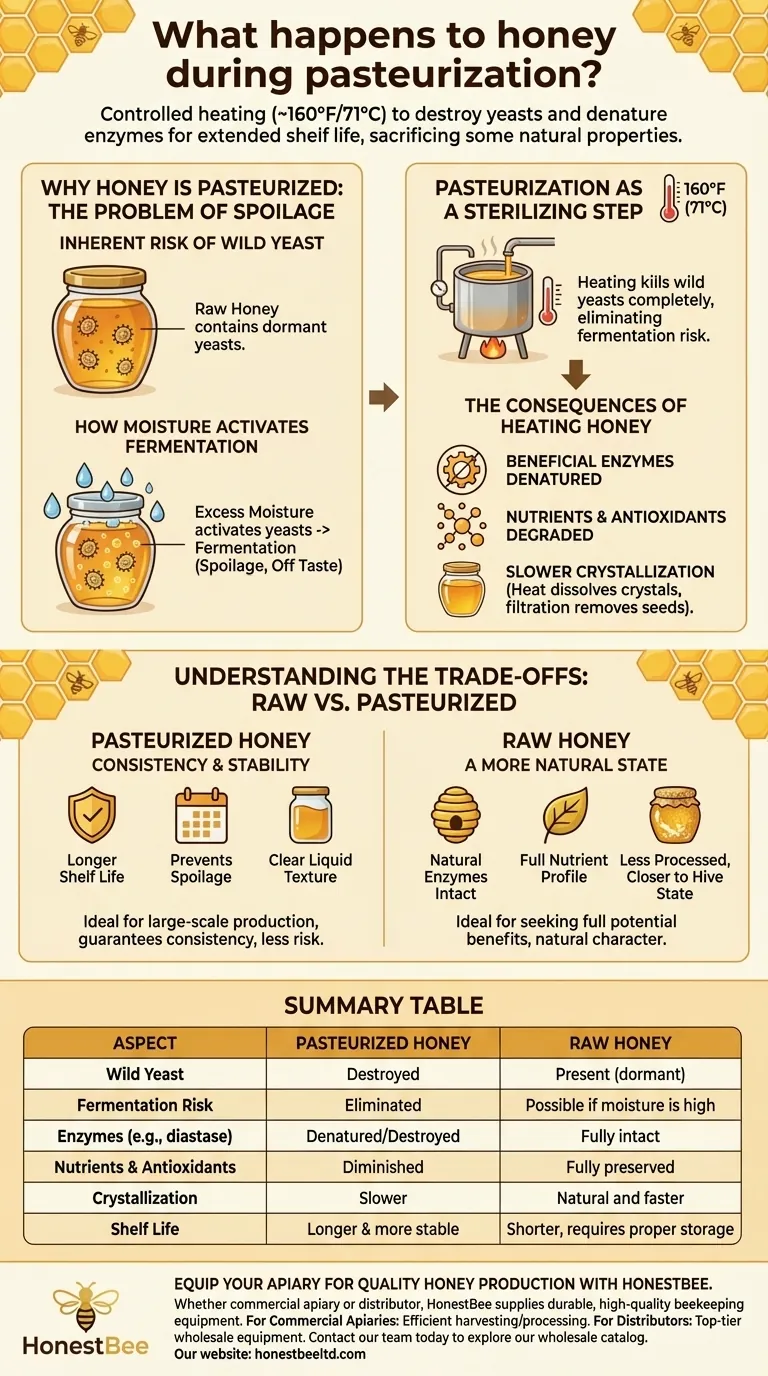
Related Products
- Fully Automatic Honey Filling Packaging Machine for Processing Line
- Automatic Honey Filling and Filtering Machine for Beekeeping Bottle Filling
- Pneumatic Double Nozzle Honey Filling Bottling Packaging Machine
- Manual Honey Filling Machine Bottling Machine for Honey
- 10L Stainless Steel Electric Honey Press Machine
People Also Ask
- How does an industrial centrifuge ensure the reliability of analysis results? Enhance Honey Extract Clarification
- What is the importance of using standardized industrial extraction equipment in the propolis extraction process? Achieve Safety & High Yield
- How does professional honey harvesting and processing equipment impact local urban beekeeping supply chains?
- What role do automated honey packaging lines play in managing production costs? Enhance Efficiency and Profitability
- Why is the use of dedicated honey-processing equipment required for organic honey production? Ensure Total Purity
- What is the role of industrial-grade honey processing facilities? Enhance Purity and Global Market Readiness
- What function does a honey colorimeter using the Pfund scale serve? Evaluate Honey Quality and Storage Changes
- What is the primary purpose of vacuum concentration in honey analysis? Preserve Heat-Sensitive Compounds Effectively


